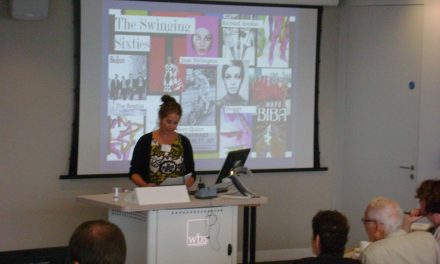Sun, sea and only moderate engagement with omnipresent social problems other than those which can be resolved in a 42-minute action-adventure/comedy-drama/pseudo-private-investigation series – if that seems familiar then you may have seen promos and/or the occasional episode of Almost Paradise (WGN/ABS-CBN 2020; Amazon Freevee/ABS-CBN 2023), a US-Philippines co-production with a complicated production history. While there are many areas of potential enquiry, in this instance I will focus upon the series’ representation of disability, particularly with regard to mental health.
For those unfamiliar with the series, it follows Alex Walker (Christian Kane), a former DEA (Drug Enforcement Agency) agent who was forced into early retirement due to ‘hypertension,’ which is the physical manifestation of an anxiety disorder, strongly implied to be a combination of burnout and PTSD, which caused an ‘episode’ after his partner betrayed him.[1] To avoid stress he returns to a (fictitious) resort town, Mabuhay,[2] part of the (real) Mactan-Cebu area in the Philippines, where he had once visited and intends to live a quiet life running a small gift shop. Because this is television, however, Walker’s once-quiet beach has, in the 15-year time span since his last visit, become home to luxury resorts ultimately leading to him being drawn into law enforcement once again in much the manner of a private detective, working primarily with two local police detectives, Kai Mendoza (Samantha Richelle) and Ernesto Alamares (Art Acuña) who, along with their chief, Ike Ocampo (Nonie Buencamino), often ask for his help with varying levels of reluctance. That reluctance, particularly from Mendoza, is initially based upon Alex being an outsider. In later episodes, however, it is more to do with him being personally somewhat abrasive and something of a maverick. This reluctance eases throughout series one and is gone by series two.
Walker is reminiscent of (though somewhat subverting) the ‘hardboiled’ private detectives most commonly associated with American crime fiction (Matzke and Mühleisen, 2006). That said, his main characteristic as discussed within the series is his mental health. Though in series one it was often conflated with the physical manifestation of hypertension, leading to multiple hypertensive crises (1.1, 1.2, 1.10), in both series it is made very clear diegetically that the physical ailment is caused by the mental health crises. Though not explicitly stated, Walker’s anxiety disorder seems to stem from ‘real life,’ as he puts it in 1.2 – the politics, bureaucracy and the feeling of impotence and inability to make any lasting change are what causes his anxiety and stress – with PTSD and/or moral injury possibly contributing.
The quote used for the title of this blog is from 1.1 and was a taunt by a former superior officer at the DEA who Walker worked ‘with’ (ultimately against) on a case. This, along with the fact that Walker is only on a temporary disability support programme (which ends after 2.1, though as of 2.2 he remains in off-camera therapy), illustrates how little support there is in the diegetic reality which mimics reality. Though he is described as a ‘legend’ (1.1) and is shown to be extremely skilled, Walker does not fall into the ‘supercrip’ stereotype in which
… representations rely on concepts of overcoming, heroism, inspiration, and the extraordinary. … representations focus on individual attitude, work, and perseverance rather than on social barriers, making it seem as if all effects of disability can be erased if one merely works hard enough (Schalk, 2017: 73).
Quite the contrary, though Walker is shown having to work to change his worldview in order to manage his stress, the series focuses strongly on the lack of institutional – i.e., subcultural – support Walker is given by the DEA juxtaposed with the support he receives from Mendoza and Alamares. Walker was and is diegetically extraordinary but that aspect is not linked directly to his mental or physical health. Rather, he is able to engage in law enforcement activities when supported emotionally and when given agency with regard to which cases he becomes involved in.
The clear analogy being made within the series – explicitly in 1.1 – is that of military veterans who develop mental health problems due to their service. Samuels (2017) notes that veterans are often portrayed as being inherently unstable, damaged and damaging (Lee, 2021 on PTSD and its representation); Scott and Bates (2017) further note that anxiety disorders are particularly discursively linked to women, reinforcing sexist stereotypes connecting women with weakness and/or mental health problems as emasculating. While both discourses are evident from the way in which Walker’s former colleagues treat him, the series is at pains to show that Walker is secure in his masculinity, as he is juxtaposed against toxically masculine villains, particularly in series 2, though he is also presented as heteronormative and extremely skilled in fighting and other ostensibly ‘masculine’ enterprises. That said, both the character and the series are able to explore masculinity and vulnerability in this context as part of its overall subversion of rigid gender norms. The mental health aspect of his character, though needing ongoing support, is without contradiction to his masculinity or any other traits. Thus, unlike in Mithout (2017), the diegetic use of disability here seems less about mimicking or exacerbating existing social problems relating to gender and more about directly interrogating and subverting gendered associations relating to mental health.
There is, of course, another reason to afflict Walker with a chronic illness brought on by stress, however defined. The need to avoid hypertensive crises and the anxiety/stress that causes them prevents him from becoming a vigilante or the series from becoming a standard private detective series in which the detective actively seeks cases to solve (and be paid for). While this can certainly be read as another form of distinction, just as the location is, it also functions to ameliorate, though, I would argue, not entirely prevent, the series from embracing a ‘white saviour’ narrative. Rather than relying entirely upon coincidence or giving Walker unchecked authority over investigations, he usually only becomes involved when asked (and, as stated in 1.2 and 2.9, when he becomes involved in cases through coincidence, not always then). The point is that the character is not interested in imposing his maleness, whiteness and/or Americanness onto the local law enforcement – quite the opposite, as in 1.1 when he contrives a way to prevent the DEA/Interpol from taking a suspect by arranging for him to be arrested for murder under local jurisdiction, sacrificing his own possibility for a better pension in the process. Instead, Walker (sometimes) accepts the direct invitation of the local police, though this can lead to an imposition onto them. Walker, though not anti-American, is positioned as a veteran who was abandoned by his government after he had been broken by the demands of that government. As such, he protects and helps others who might fall prey to those with greater geopolitical and/or sociocultural power.
That said, the fact that his expertise is needed at all – and the ways in which it can be delivered, though such blatant examples as Walker taking over Mendoza’s briefing in 1.1 are reduced as the series progresses – can be read as the premise of the series embracing this ‘American/white saviour’ narrative. Nevertheless, diegetically the series is at pains to avoid it, at least when dealing with people, often foreigners, using the region as part of their criminal organisations.[3] A more direct and/or thorough exploration of this tension between the series’ premise and its diegetic acknowledgements and attempts at amelioration would help to resolve this, though such depth of postcolonial geopolitics seems unlikely in an action-orientated comedy-drama. While in series two anti-American sentiments, both understandable (i.e., by a WWII veteran resentful of ignored sacrifices of himself and another Waray guerilla fighter by the American government, 2.4[4]) and unjustified (i.e., fuelled by racism and featuring attendant homophobia and toxic masculinity as in 2.2) are addressed and, in the case of 2.4, connected to historical power imbalances, the premise of the series still requires an acceptance that the white American man is the hero and expert needed for the local population to be safe, even if done in partnership with those local authorities.
Walker’s disability is clearly designed as a diegetic reason for him to be in Mactan-Cebu, the filming location. But it also illustrates the institutionalised failures and negative, often gendered, discourses surrounding mental health and those whose law enforcement and/or military service have caused such psychological injuries. Almost Paradise, though imperfect, shows that healing such a wound is a long process, full of backslides, frustrations and pain. It may not be even close to paradise, but, with support, the series also shows that a successful recovery is more than possible.
Dr Melissa Beattie is a recovering Classicist who was awarded a PhD in Theatre, Film and TV Studies from Aberystwyth University where she studied Torchwood and national identity through fan/audience research as well as textual analysis. She has published and presented several papers relating to transnational television, audience research and/or national identity. She is suddenly an independent scholar. She has worked at universities in the US, Korea, Pakistan, Armenia, Ethiopia and for a brief time in Cambodia. She can be contacted at tritogeneia@aol.com.
Footnotes
[1] Beginning in 1.2, in the credits’ saga cell, he states ‘I quit the agency because my friend and partner betrayed me.’ This is not exactly the case, according to 1.1 in which he was invalided out on disability after a mental health crisis and several times throughout series 1 he is shown keeping an anxiety journal as part of his doctor’s requirements for him to continue to get disability payments. For the series 2 saga cell, the line is cut entirely.
[2] ‘Mabuhay’ is a Filipino greeting meaning ‘live/be/exist.’ This can therefore be read ironically in that, though Walker wants to simply ‘be,’ he is drawn back into ‘do[ing].’ There is a ‘Mabuhay Beach House’ hotel on Boracay, but it is on the other side of the island from Cebu; Mactan, an island off the coast of Cebu, seems to be where the series is set.
[3] As is typical of many such narratives, Walker has a daughter, Evelyn (Nathalie Morris), who is targeted by his vindictive ex-partner, Todd Carpenter (Jared Turner). Walker engages in outright vigilantism to confront and kill his ex-partner, though Evelyn assists in her own escape through a trick her father had taught her about escaping from zip ties.
[4] This is a clear parallel to Walker’s feelings of abandonment by the DEA/US government due to a lack of mental health support.
References
Lee J (2021) Post-traumatic stress disorder in Taxi Driver and You Were Never Really Here: a comparative progressive approach. In Johnson M and Olsen C J (eds). Normalizing Mental Illness and Neurodiversity in Entertainment Media: Quieting the Madness. London: Routledge, pp. 162-176.
Matzke C and Mühleisen S (2006) Postcolonial postmortems: Issues and perspectives. In Matzke C and Mühleisen S (eds), Postcolonial Postmortems: Crime Fiction from a Transcultural Perspective. Amsterdam: Rodopi, pp. 1-16.
Mithout A (2020) Disabled heroines: Representations of female disability in Japanese television dramas. In Johannssen J and Garrisi D (eds). Disability, Media, and Representations: Other Bodies. London: Routledge, pp. 114-134.
Samuels E (2017) Prosthetic heroes: Curing disabled veterans in Iron Man 3 and beyond. In Ellcessor E and Kirkpatrick B (eds). Disability Media Studies. NY: NYU Press, pp. 129-151.
Schalk S (2016) Reevaluating the supercrip. Journal of Literary & Cultural Disability Studies 10:1, pp. 71-87.
Scott, D T and Bates M (2017) “It’s not just sexism”: Feminization and (ab)normalization in the commercialization of anxiety disorders. In Ellcessor E and Kirkpatrick B (eds). Disability Media Studies. NY: NYU Press, pp. 152-176.





